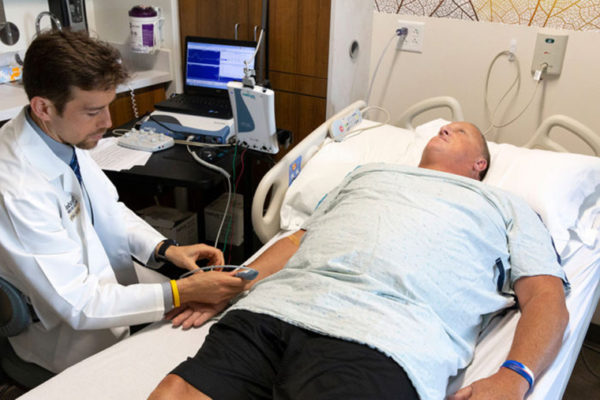Decriminalizing pot doesn’t lead to increased use by young people
Researchers at the School of Medicine have found that in five states that decriminalized marijuana, there was no corresponding rise in the drug’s use among young people. In addition, marijuana-related arrests declined significantly.
Researchers engineer bacteria that create fertilizer out of thin air
A team at Washington University in St. Louis has created a bacteria that uses photosynthesis to create oxygen during the day, and at night, uses nitrogen to create chlorophyll for photosynthesis. This development could lead to plants that do the same, eliminating the use of some — or possibly all — man-made fertilizer, which has a high environmental cost.
New ALS therapy in clinical trials
New School of Medicine research indicates an investigational therapy for an inherited form of ALS extends survival and reverses signs of neuromuscular damage in mice and rats.
Andrew Martin appointed 15th chancellor of Washington University
Andrew D. Martin, dean of the College of Literature, Science, and the Arts at the University of Michigan, has been appointed the 15th chancellor of Washington University in St. Louis, effective June 1, 2019, according to Craig D. Schnuck, chair of the university’s Board of Trustees.
WashU Expert: Papa needs … a new name?
Papa John’s should consider whether it needs a facelift and a new identity after its highly recognizable founder resigned amid continuing controversy. That’s the perspective of a public-relations expert, longtime practicing professional and leader in business communications at Washington University in St. Louis’ Olin Business School.
Report addresses national shortage of physician-scientist trainees
Projected demand for physician-scientists exceeds the expected supply, studies indicate. Melvin Blanchard, MD, director of the Division of Medical Education, led a multi-institution project to develop recommendations to improve U.S. training programs.
VIP neurons hold master key to jet lag response
By activating a small subset of the neurons involved in setting daily rhythms, biologist Erik Herzog in Arts & Sciences has unlocked a cure for jet lag in mice, as reported in a July 12 advance online publication of Neuron.
WashU Expert: Trump’s Supreme Court and Roe v. Wade
The nomination of Brett Kavanaugh to the U.S. Supreme Court has renewed debate about the future of Roe v. Wade. Mary Ann Dzuback, chair of the Department of Women, Gender and Sexuality Studies in Arts & Sciences, suspects that conservative justices will continue chipping away at reproductive choice, rather than mount a frontal assault on the decision. But she warns that by undermining Roe’s guarantee of reproductive choice, the court risks its own reputation and authority.
Hudson appointed to lead new Academy for Diversity and Inclusion
Nicole Hudson, deputy mayor for racial equity and priority initiatives for the City of St. Louis, has been appointed assistant vice chancellor for the newly created Academy for Diversity and Inclusion at Washington University, effective Aug. 27.
‘From Start to Finnish’ July 15
The Gateway Festival Orchestra will perform music of Jean Sibelius, Launy Grøndahl and Edvard Grieg at 7:30 p.m. Sunday, July 15, as part of its 2018 season of free summer concerts. Also on the program will be music from “Mamma Mia,” based on songs by the pop group ABBA. The concert series will continue July 22 and 29.
View More Stories









